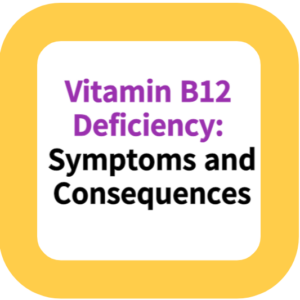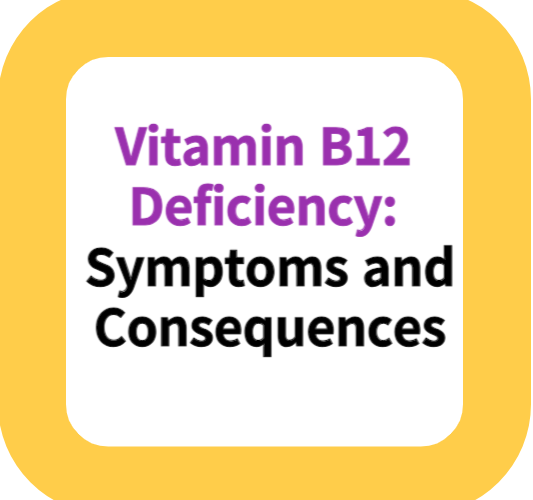Vitamin B12 Deficiency: Symptoms and Consequences
Welcome to our latest blog post, where we dive into the often overlooked yet crucial topic of Vitamin B12 deficiency. This essential nutrient, pivotal for a myriad of bodily functions, can lead to a diverse range of symptoms and health complications if not adequately maintained.
In this comprehensive guide, we explore the subtle early warning signs, delve into the various causes and risk factors, and unravel the complexities of diagnosing this deficiency. We also discuss effective strategies for treatment and management, highlighting the importance of dietary modifications and supplementation.
Whether you’re a healthcare enthusiast, someone on a vegetarian or vegan diet, or just curious about maintaining optimal health, this post provides valuable insights into the importance of Vitamin B12 and how to ensure its adequacy in your life.
Join us as we navigate the intricacies of this vital nutrient, emphasizing proactive health management and the importance of regular health check-ups, especially for those at higher risk.
Vitamin B12 Deficiency: Symptoms and Consequences

Introduction
In this comprehensive exploration, we delve into the intricate aspects of Vitamin B12 deficiency, a critical health concern often overlooked in medical discussions. Vitamin B12, essential for numerous physiological functions, can lead to a range of symptoms and health issues when deficient.
This detailed narrative aims to shed light on the symptoms, underlying causes, potential consequences, and effective management strategies for Vitamin B12 deficiency, emphasizing the importance of awareness and proactive healthcare.
Detailed Symptoms of Vitamin B12 Deficiency
Early Warning Signs: The initial symptoms of B12 deficiency are often subtle and include persistent fatigue, general weakness, and mild anemia. These can easily be mistaken for signs of aging or stress.
Neurological Indicators: More pronounced symptoms involve neurological changes such as numbness, tingling in the extremities, difficulty in maintaining balance, and memory lapses.
Psychological Aspects: Vitamin B12 deficiency can also manifest in mood alterations, ranging from depressive states to significant cognitive disturbances like confusion and reduced concentration.
Physical Manifestations: Some individuals may experience physical symptoms like a sore tongue, mouth ulcers, muscle weakness, and vision problems.
Causes and Risk Factors of Vitamin B12 Deficiency
Dietary Limitations: Those following strict vegetarian or vegan diets are at a heightened risk due to the lack of animal-derived foods, which are primary sources of B12.
Digestive Disorders: Conditions impairing the gastrointestinal tract, like Crohn’s disease or gastric bypass surgery, can severely limit B12 absorption.
Autoimmune Conditions: Pernicious anemia, an autoimmune disorder, directly affects the stomach’s ability to produce intrinsic factor, crucial for B12 absorption.
Age-Related Changes: Elderly individuals often experience reduced stomach acid production, which can hinder the absorption of B12 from food.
The Process of Diagnosing B12 Deficiency
Challenges in Diagnosis: Diagnosing B12 deficiency can be complex due to the overlap of symptoms with other conditions and the limitations of standard blood tests.
Importance of Comprehensive Testing: Accurate diagnosis often requires a combination of blood tests, including checks for serum B12 levels, methylmalonic acid, and homocysteine, along with a thorough evaluation of symptoms.
Effective Treatment and Management Strategies
Supplementation Methods: Depending on the severity, B12 deficiency is usually treated with oral supplements or intramuscular injections. The latter is often necessary in cases of severe deficiency or malabsorption issues.
Dietary Modifications: Including B12-rich foods in one’s diet, like fortified cereals, dairy products, and fish, is crucial, especially for those with dietary restrictions.
Long-term Management: Regular monitoring and possibly lifelong supplementation may be required for individuals with chronic conditions or permanent absorption issues.
Conclusion
Vitamin B12 deficiency, if left undiagnosed or untreated, can lead to a host of health complications, affecting both physical and mental well-being. Recognizing the symptoms early, understanding the causes, and seeking appropriate medical intervention are essential steps in effectively managing this deficiency.
This includes both dietary adjustments and medical treatments tailored to individual needs. Particularly for high-risk groups like the elderly, vegetarians, and people with gastrointestinal disorders, regular health check-ups and proactive management of their B12 levels are critical to maintaining optimal health and preventing long-term complications.
